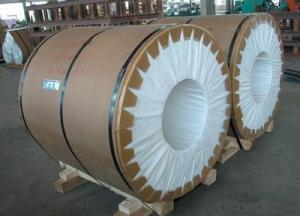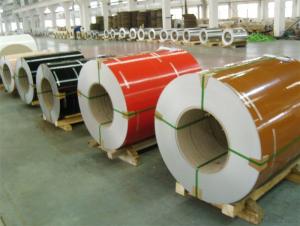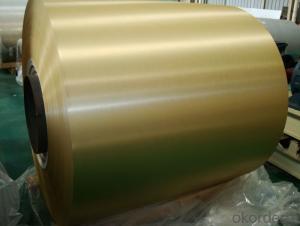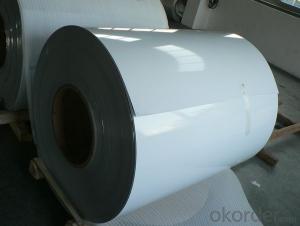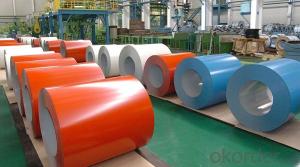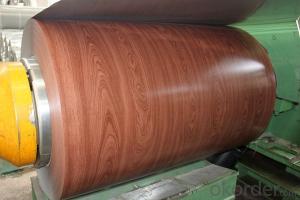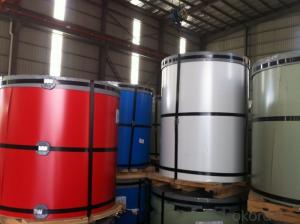Coil Coated Aluminum Color Coated Aluminium Coils for Metal Wall ACP
- Loading Port:
- Shanghai
- Payment Terms:
- TT OR LC
- Min Order Qty:
- 5 m.t.
- Supply Capability:
- 10000 m.t./month
OKorder Service Pledge
OKorder Financial Service
You Might Also Like
Specification
1. Structure of Color Coated Aluminium Coils for Metal Wall ACP Description
• Product: Aluminim coils
• Application:
corrugated roofs, outer walls, ovens, electrically controlled cabinets.
household appliances, transportation, base plate, color coating.
industrial freezers in the residential and industrial buildings.
refrigerator backplane, gas stove, air conditioner, microwave, LCD border.
• Advantage: Full production line with all kinds of coils supply
2. Main Features of the Color Coated Aluminium Coils for Metal Wall ACP
• Our goods quality is top, the surface is smooth, and every steel coil
• No Joint, No Bends, no spots, no roller marks.
• MTC will be provided with goods, third part inspection is acceptable, for example, SGS, BV. Etc
3. Color Coated Aluminium Coils for Metal Wall ACP Images
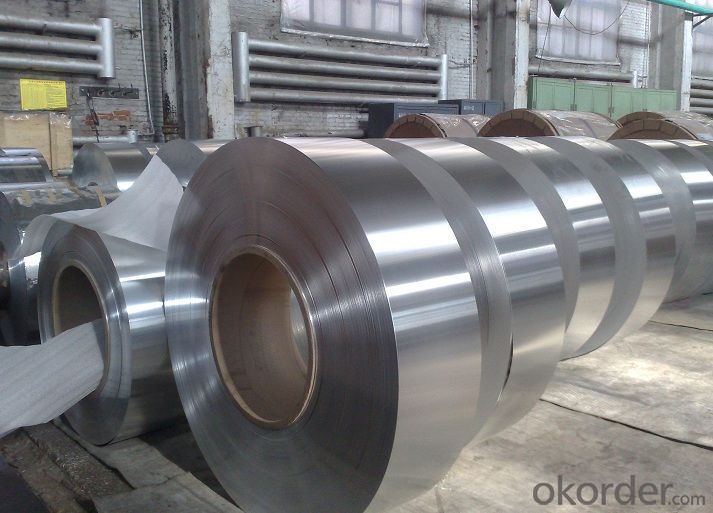
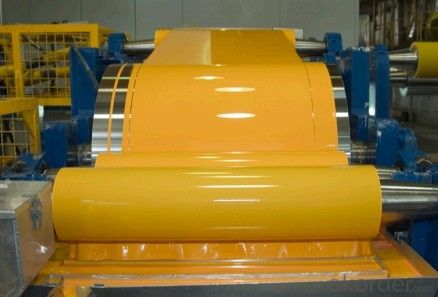
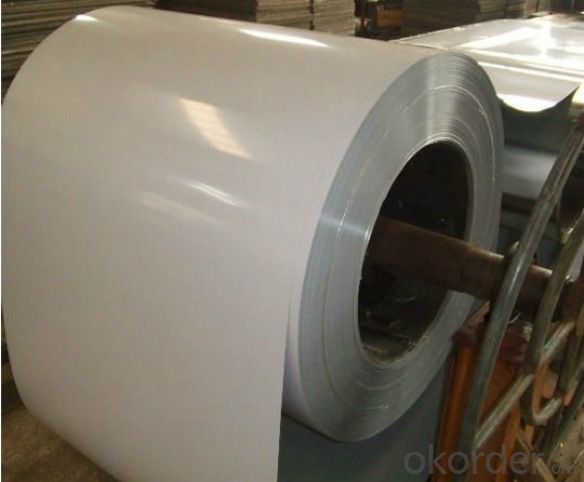
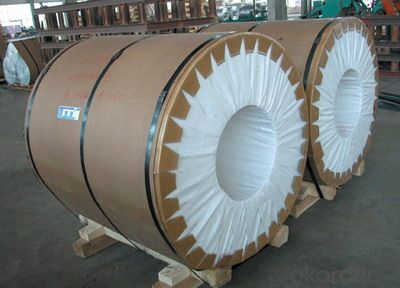
4. Color Coated Aluminium Coils for Metal Wall ACP Specification
Alloy | AA1050/1100/3003/3005/3105/5005/5052 etc |
Thickness | 0.03mm—4.0mm |
Width | 10mm—1600mm |
Coating | PVDF, PE |
Coatingthickness | Usually16-25 micron, could be 33-40 micron |
Color | According to Ral |
Standard | ASTM-B 209 GB/3008-2006 |
Usage/ApplicationsCoated Aluminum Coil/Sheet | Constructionand decoration, electronic appliances, lighting decoration, air-condition airpipe, sandwich panels and drainage, etc |
5.FAQ of Color Coated Aluminium Coils for Metal Wall ACP
We have organized several common questions for our clients,may help you sincerely:
① How about your company?
A world class manufacturer & supplier of aluminum coil and alloy blanks. Aluminum production base is comprised of 18 aluminum annealers, 10 coil and foil mills, 4 continuous production lines, 2 hot rolling production line and 3 prepainted lines.
Export 5000 tons per month to Asia, America and Middle East. Always do the best for our clients.
②Can you guarantee the quality of the products?
We are responsible for the quality of materials to get a long-term cooperation with clients in a reasonable period of time and we are glad to arrange and coordinate any third party inspection for you.
③What is the delivery time after purchase?
35 day after receiving client’s deposit or correct LC
- Q: Are aluminum coils suitable for architectural facades?
- Yes, aluminum coils are suitable for architectural facades. Aluminum is a popular choice for architectural facades due to its numerous advantages. Firstly, aluminum is lightweight, which makes it easier to handle and install compared to other materials. This is especially beneficial for high-rise buildings or complex architectural designs. Secondly, aluminum is highly durable and corrosion-resistant. It is naturally resistant to rust and does not require any additional coatings or treatments. This makes aluminum coils suitable for long-term use in various weather conditions, including harsh climates or coastal areas where corrosion is a concern. Furthermore, aluminum coils offer versatility in terms of design and customization. They can be easily formed into different shapes, sizes, and profiles, allowing architects and designers to create unique facades that meet their specific requirements. Aluminum can also be painted or coated in different colors and finishes to achieve the desired aesthetic appeal. In addition to its functional and aesthetic advantages, aluminum is also an environmentally friendly choice. It is a recyclable material, meaning that it can be reused indefinitely without losing its properties. This makes aluminum coils a sustainable option for architectural facades, aligning with the growing focus on green building practices. Overall, aluminum coils are a suitable choice for architectural facades due to their lightweight nature, durability, versatility, and sustainability. They offer a wide range of design possibilities while ensuring long-term performance and low maintenance requirements.
- Q: My dad saw an alternative medicine practioner who said he had high levels of aluminum in his blood ... from using aluminum cookware. She said this was causing the shortness of breath and dizziness he was experiencing. Since he has stopped using aluminum cookware, he is now fine. He saw regular doctors, and nobody else could figure out what was wrong with him. Has anyone else out there had any experience with this?
- No but alumimun cookware can cause Alzheimer's
- Q: Aluminum is a transition metal, woudn't the stock naming system apply to this formula?
- Aluminium has only one oxidation state i.e +3. Hence it does not matter whether we call it aluminium (iii) oxide or simply aluminium oxide. However copmare iron oxide. Here it could be FeO or Fe2O3 so we have to distinguish by indicating Iron (II) Oxide for FeO and Iron (III) oxide for Fe2O3.
- Q: I'm wondering if there is a resin/molding material that can withstand the heat of melted aluminum for casting parts. I know that sand casting is the 'norm' but is there anything else? I'd rather not have to pack sand every time I want to cast a part.Thanks!
- One common mold material for metal casting is plaster mixed with silica sand to give it more strength. It needs to be completely (like heated) dry before you use it, but it is actually more work than sand casting but it gives a better finish. There are some rubber materials which can withstand the heat of casting pewter, but the melting point of pewter is so much lower than aluminum that I am sure those won't work for aluminum. I think you are pretty much stuck with sand for the easiest method.
- Q: How are aluminum coils used in HVAC systems?
- The excellent heat transfer properties and durability of aluminum coils make them widely used in HVAC systems. These coils play a vital role in cooling by efficiently extracting heat from the air. In HVAC systems, you will typically find aluminum coils in the condenser and evaporator units. The condenser coil releases heat to the surroundings by transferring it to the outdoor air, while the evaporator coil absorbs heat from indoor air, cooling it down. Aluminum is the preferred material for these coils because of its high thermal conductivity, allowing for efficient heat transfer. The coils consist of thin aluminum fins attached to aluminum tubes. This design maximizes the coil's surface area, enabling better heat exchange between the refrigerant flowing through the tubes and the air passing over the fins. During the cooling process, the coil's refrigerant absorbs heat from the indoor air, transforming it into a gas. The heat is then transferred to the aluminum fins, where it dissipates into the surrounding air. Consequently, the air passing through the evaporator coil becomes cooler, creating a comfortable indoor environment. Similarly, in the condenser unit, the refrigerant releases heat to the outdoor air through the aluminum coils. This allows the refrigerant to return to its liquid state, ready to be cycled back to the evaporator coil for the cooling process to continue. Aluminum coils are also favored in HVAC systems due to their corrosion resistance, ensuring their longevity and reliability. They are lightweight, making installation and maintenance easier. Moreover, aluminum coils are recyclable, contributing to a more sustainable and eco-friendly HVAC system. In summary, aluminum coils are crucial components of HVAC systems, providing efficient heat transfer, durability, and corrosion resistance. Their use greatly contributes to the cooling and comfort of indoor spaces.
- Q: Are there any limitations to the coil weight of aluminum coils?
- Yes, there are limitations to the coil weight of aluminum coils. The coil weight of aluminum coils is primarily limited by the capacity of the equipment used for handling and transporting the coils. Different machinery and materials handling systems have different weight capacities, and exceeding these capacities can lead to safety hazards and damage to the equipment. Additionally, the size and dimensions of the coils can also impact the maximum weight limit. Larger coils tend to have a higher weight limit, as they have a larger surface area to distribute the load. However, there is a practical limit to the weight that can be carried by the machinery and equipment, regardless of the coil size. Moreover, the strength and integrity of the material being used also play a role in determining the coil weight limit. Aluminum is a lightweight material with a high strength-to-weight ratio, which allows for larger coil weights compared to other materials. However, extreme weight can cause deformation or damage to the coil, affecting its quality and usability. It is important to consider these limitations and adhere to the manufacturer's recommendations and industry standards when determining the maximum coil weight. Proper handling, storage, and transportation procedures should be followed to ensure the safety of personnel and the integrity of the aluminum coils.
- Q: What is the role of aluminum coils in the automotive industry?
- Aluminum coils play a crucial role in the automotive industry as they are used in the manufacturing of various vehicle components. These coils are primarily utilized in the production of heat exchangers, such as radiators and condensers, which are responsible for regulating engine temperature and air conditioning systems. Aluminum coils offer excellent heat transfer properties, lightweight construction, and corrosion resistance, making them ideal for enhancing vehicle performance and fuel efficiency. Additionally, they are also utilized in the fabrication of body panels, frames, and suspension components, contributing to the overall weight reduction of automobiles.
- Q: How exactly can you tell (just by looking) that the nipple used to tighten a spoke is brass and not aluminum? I know some are silver - not sure if they are painted silver or what. But without scraping or causing any damage to the nipple, how would one know for sure if they have no experience between the two.p.s. I don't know how heavy or light either is, so if that is one way to tel, it's not a good way for me.
- Well, in reality you can't tell just by looking. Aluminum nipples are generally only found on superlight race wheels rather than run-of-the-mill stuff. Brass nipples are hardly ever gold colored- they are usually chrome plated or black while aluminum and plain steel nipples can be just about any color. Aluminum nipples are VERY soft compared to brass and will strip and fail in the hands of the amateur builder or repair person. UNfortunately, this is the best way to determine whether a nipple is aluminum or brass while on the wheel- when it fails due to poor skills or overstressing the wheel.
- Q: Are aluminum coils resistant to corrosion?
- Yes, aluminum coils are highly resistant to corrosion due to the natural oxide layer that forms on their surface, protecting them from environmental factors.
- Q: What are the density and specific gravity values of aluminum coils?
- The density of aluminum coils is approximately 2.7 g/cm³, and the specific gravity value is approximately 2.7.
Send your message to us
Coil Coated Aluminum Color Coated Aluminium Coils for Metal Wall ACP
- Loading Port:
- Shanghai
- Payment Terms:
- TT OR LC
- Min Order Qty:
- 5 m.t.
- Supply Capability:
- 10000 m.t./month
OKorder Service Pledge
OKorder Financial Service
Similar products
Hot products
Hot Searches
Related keywords
